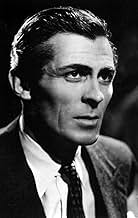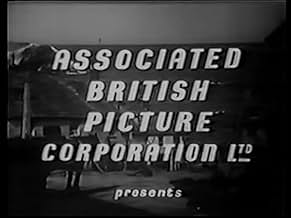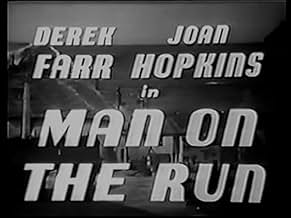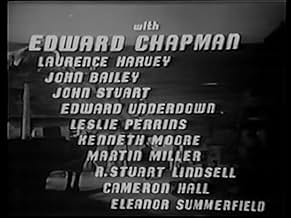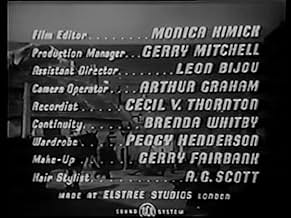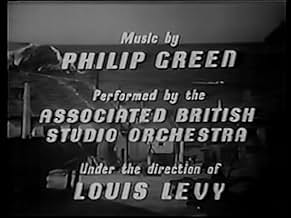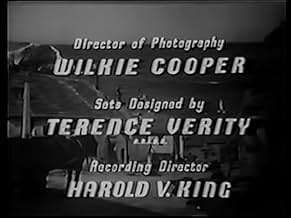Adicionar um enredo no seu idiomaIn post-war Britain, an army deserter unwittingly gets involved in murder and armed robbery and enlists the aid of a war widow to help clear his name.In post-war Britain, an army deserter unwittingly gets involved in murder and armed robbery and enlists the aid of a war widow to help clear his name.In post-war Britain, an army deserter unwittingly gets involved in murder and armed robbery and enlists the aid of a war widow to help clear his name.
Howard Marion-Crawford
- 1st Paratrooper
- (as Howard Marion Crawford)
Kenneth More
- Corporal Newman
- (as Kenneth Moore)
Martin Miller
- Cafe Proprietor
- (as Martyn Miller)
Avaliações em destaque
Although I saw this on a very poor DVD transfer it held my attention from beginning to end. Yes, as other reviewers have pointed out, there's nothing new here, but it's expertly done, and it's interesting to know that there were apparently 20,000 deserters on the run in the UK in 1949, and one imagines that many of them were as hard-done-by as our hero, but I won't spoil anything by revealing why he deserted. The film is certainly sympathetic to those 20,000 men who get the blame, by several representative members of the cast, for everything that's wrong with post-war Britain. Derek Farr is excellent in the main role as the deserter who has to raise some money when Kenneth More, who had served in the same outfit, happens into the pub where he's working under an alias and decides to blackmail him. While he's trying to pawn a gun the pawnshop is robbed and a policeman killed making him one of the suspects. Joan Hopkins is the sympathetic woman who helps him. Edward Chapman is the inspector investigating the case with ever-increasing impatience. Laurence Harvey, although billed fourth, has little to do as a sergeant with a soft spot for Hopkins. Plenty of noir atmosphere. Recommended.
10clanciai
What you will remember of this film is the local atmosphere from the post war London with its rather weary aspect both in people and their minds and the shaggy streets, ultimately leading you down to old Wapping with one of the most genuine pub atmospheres found in any film, but there is a long way to go before that.
You will also remember the difficult case of 20,000 deserters after the war, many of them turning to criminality for having no other choice. That's the clinch in which our hero finds himself, when a burglary takes place the moment he is trying to pawn his old gun without bullets, the two robbers in desperation shooting both the clerk and, when on the run, a policeman fatally - the first casualty in the film. The clerk recovers and gives a description of our hero, whom he saw, while the two burglars were masked. So our hero finds himself wanted for murder. Could you get into any deeper sea of trouble?
It's also memorable for the fine performance by Joan Hopkins, who plays a widow who believes in our hero's innocence, Kenneth More has a small part in the beginning, which turns out fatal for our hero on a constant run, and Laurence Harvey is a policeman - neither is sympathetic. Derek Farr plays our hero convincingly enough, a completely ordinary man with an inordinate amount of bad luck, having lost practically all his family in the war. It's a sad story but well made, and the beautiful music adds some extra romantic and melancholy charm to it. In spite of the poor technical quality, I must give it almost a full score for its interesting story of an eloquent script, fluent tempo and excellent cinematography.
You will also remember the difficult case of 20,000 deserters after the war, many of them turning to criminality for having no other choice. That's the clinch in which our hero finds himself, when a burglary takes place the moment he is trying to pawn his old gun without bullets, the two robbers in desperation shooting both the clerk and, when on the run, a policeman fatally - the first casualty in the film. The clerk recovers and gives a description of our hero, whom he saw, while the two burglars were masked. So our hero finds himself wanted for murder. Could you get into any deeper sea of trouble?
It's also memorable for the fine performance by Joan Hopkins, who plays a widow who believes in our hero's innocence, Kenneth More has a small part in the beginning, which turns out fatal for our hero on a constant run, and Laurence Harvey is a policeman - neither is sympathetic. Derek Farr plays our hero convincingly enough, a completely ordinary man with an inordinate amount of bad luck, having lost practically all his family in the war. It's a sad story but well made, and the beautiful music adds some extra romantic and melancholy charm to it. In spite of the poor technical quality, I must give it almost a full score for its interesting story of an eloquent script, fluent tempo and excellent cinematography.
Derek Farr deserted from the British Army after four years of service and went underground. Now he is at the end of his rope, so he takes his service revolver to a pawn shop.... to pawn it. While he's standing there, two other men enter, knock out the owner and flee, killing a bobby as they go. Now Farr is really being pursued and he randomly stops Joan Hopkins... who agrees to help him.
There are definite noir elements in this movie, with discussion the estimated 20,000 deserters and some grimy cinematography by DP Wilkie Cooper, but that's about the limits of it. Otherwise, writer-director Lawrence Huntington has turned out a reasonably taut man-accused movie. Despite a decent story, the movie itself is curiously inert, with a lot of talk and not much movement.
Farr is clearly not wearing his hairpiece for this movie, an odd choice for a romantic lead type, but that, I suppose, it part of the noir aspect of it. Watch out for Laurence Harvey in his second screen appearance, playing a detective. He's only mildly creepy in this one.
There are definite noir elements in this movie, with discussion the estimated 20,000 deserters and some grimy cinematography by DP Wilkie Cooper, but that's about the limits of it. Otherwise, writer-director Lawrence Huntington has turned out a reasonably taut man-accused movie. Despite a decent story, the movie itself is curiously inert, with a lot of talk and not much movement.
Farr is clearly not wearing his hairpiece for this movie, an odd choice for a romantic lead type, but that, I suppose, it part of the noir aspect of it. Watch out for Laurence Harvey in his second screen appearance, playing a detective. He's only mildly creepy in this one.
The great shame of unused female actors in British cinema is far too long; Joan Greenwood was an example, and rarely given roles that were truly worthy of her. Joan Hopkins is another and even less well known than Greenwood or many others. A pity because she had a statuesque beauty, and a quiet charm and in some shots her beauty almost rivals Greta Garbo. Opposite Derek Farr there is good chemistry, and for once she is pivotal to the film and not only decoration. Farr is a deserter from WW2 and on the run not only for that, but for a murder he is suspected of committing. Hopkins takes him into her flat and the two fall in love. I liked too the atmosphere of the UK after the war, with its turmoil at getting back to a previous life that will never come again. A fluctuating chaos that lasted through the late 1940's and the mid to late 1950's. The film is rich on detail, and there is Kenneth More as a war veteran in a small but significant role. Well directed,, and in the main well acted, it is worthy of hunting down for all those interested in this period of history, and the run down houses peeling with damp and cold bear no resemblance to the wealth there today. These films are essential to UK history and the passing of times, and the poverty and wealth that goes with it. And Joan Hopkins is quite simply excellent.
Peter Burden (Derek Farr) is an army deserter, one of twenty thousand British men who live in fear of imprisonment even after the war has ended. Having served four years, the authorities denied his request for compassionate leave in order to attend his mother's deathbed and he absconded in disgust. He is now working as a landlord of a country pub and is pulling pints when an old army acquaintance (Kenneth More) walks in and recognizes him. Corporal Newman is newly demobbed and, having found only low-paid work in the area, opportunistically blackmails Burden. Terrified, Burden flees again, this time returning to London, where a lack of funds and the late rent on a ragged bedsit force him to try and pawn his old service revolver. At the jeweller's, however, two armed robbers arrive and promptly kill a copper, with Burdon believed to be part of the gang.
His attempts to elude the police become more perilous than ever and a desperate escape sees him bounding breathlessly into the house of young widow Jean Adams (Joan Hopkins). Jean takes pity on the ex-soldier and agrees to help. The pair become determined to find the robbers, knowing only that one of them (Edward Underdown) is missing two fingers on his left hand. All the while, they must avoid the grimly persistent Chief Inspector Mitchell (Edward Chapman) and Detective Sergeant Lawson (a young Laurence Harvey), who prove to be quite able pursuers...
Lawrence Huntington directed, produced and wrote this foray into near-noir which was presumably inspired by the many deserters still at large long after V. E. Day. His script carefully positions Burdon as a sympathetic figure (the name is well-chosen).
The sad circumstances surrounding his desertion and the fact he had spent most of the war in combat is repeated at least once. To steer clear from presenting him as a coward or a chancer was undoubtedly important as everyone in the audience would have known soldiers or might even have been one themselves. Huntington also has his protagonist plea for a more constructive solution to the problem, particularly when so many such people inevitably turn to crime to survive. This situation, often forgotten today, makes Man on the Run interesting and slightly more nuanced than other chase thrillers, though it so solidly sides with Burdon that a more minute exploration of similar issues facing other such soldiers - for example, post-traumatic stress or the frustrating futility of war itself - is avoided altogether. There's a sense that each man would have his own story, though nobody describes what those might be.
Derek Farr is excellent as Burdon: pained, thoughtful, and reluctant to enlist anyone else's help. It's a shame he didn't have more of a career as he could easily have become a Kenneth More. More himself pops up early on, well before his middle-class every-man persona, like an English James Stewart in tweeds and a pipe, would lead him to become one of Britain's biggest film stars.
The police investigation, meanwhile, is headed by the sort of dogged, pipe-smoking detective familiar to pictures of this period, with Chapman's chief inspector wry and astute enough to elicit tension.
It's this quietly humming, will-they-catch-him? Element which carries the film, particularly in the excellent first half, though a thrilling set-piece of the sort included in The 39 Steps (which also had a bad guy deprived of a digit) or North By Northwest is unfortunately even more elusive than Burdon himself.
Particularly interesting for its glimpses of post-war life (from genuine London locations to a reference to radio's proto-James Bond Dick Barton), plus some gently amusing moments, Man on the Run makes for an entertaining and compelling thriller which is much recommended.
His attempts to elude the police become more perilous than ever and a desperate escape sees him bounding breathlessly into the house of young widow Jean Adams (Joan Hopkins). Jean takes pity on the ex-soldier and agrees to help. The pair become determined to find the robbers, knowing only that one of them (Edward Underdown) is missing two fingers on his left hand. All the while, they must avoid the grimly persistent Chief Inspector Mitchell (Edward Chapman) and Detective Sergeant Lawson (a young Laurence Harvey), who prove to be quite able pursuers...
Lawrence Huntington directed, produced and wrote this foray into near-noir which was presumably inspired by the many deserters still at large long after V. E. Day. His script carefully positions Burdon as a sympathetic figure (the name is well-chosen).
The sad circumstances surrounding his desertion and the fact he had spent most of the war in combat is repeated at least once. To steer clear from presenting him as a coward or a chancer was undoubtedly important as everyone in the audience would have known soldiers or might even have been one themselves. Huntington also has his protagonist plea for a more constructive solution to the problem, particularly when so many such people inevitably turn to crime to survive. This situation, often forgotten today, makes Man on the Run interesting and slightly more nuanced than other chase thrillers, though it so solidly sides with Burdon that a more minute exploration of similar issues facing other such soldiers - for example, post-traumatic stress or the frustrating futility of war itself - is avoided altogether. There's a sense that each man would have his own story, though nobody describes what those might be.
Derek Farr is excellent as Burdon: pained, thoughtful, and reluctant to enlist anyone else's help. It's a shame he didn't have more of a career as he could easily have become a Kenneth More. More himself pops up early on, well before his middle-class every-man persona, like an English James Stewart in tweeds and a pipe, would lead him to become one of Britain's biggest film stars.
The police investigation, meanwhile, is headed by the sort of dogged, pipe-smoking detective familiar to pictures of this period, with Chapman's chief inspector wry and astute enough to elicit tension.
It's this quietly humming, will-they-catch-him? Element which carries the film, particularly in the excellent first half, though a thrilling set-piece of the sort included in The 39 Steps (which also had a bad guy deprived of a digit) or North By Northwest is unfortunately even more elusive than Burdon himself.
Particularly interesting for its glimpses of post-war life (from genuine London locations to a reference to radio's proto-James Bond Dick Barton), plus some gently amusing moments, Man on the Run makes for an entertaining and compelling thriller which is much recommended.
Você sabia?
- CuriosidadesThe dialogue includes several clear uses of "basket" as a minced oath for "bastard". However the film was given an 'A' certificate (for "Adult Audiences") by the British Board of Film Censors, because of the depiction of an armed robbery.
- Erros de gravaçãoKenneth More is listed as Kenneth Moore in the opening credits but is listed correctly in the closing credits.
- Citações
Sgt. Peter Burden, alias Brown: Well, do you believe any of this, or am I just wasting my time?
Principais escolhas
Faça login para avaliar e ver a lista de recomendações personalizadas
Detalhes
- Data de lançamento
- País de origem
- Idioma
- Também conhecido como
- Mann im Netz
- Locações de filme
- Empresa de produção
- Consulte mais créditos da empresa na IMDbPro
- Tempo de duração1 hora 22 minutos
- Cor
- Proporção
- 1.37 : 1
Contribua para esta página
Sugerir uma alteração ou adicionar conteúdo ausente


